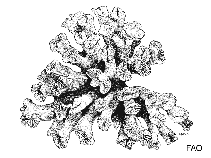Crispatotrochus rubescens (Moseley, 1881)
Warning: DOMDocument::load(): SSL operation failed with code 1. OpenSSL Error messages: error:140770FC:SSL routines:SSL23_GET_SERVER_HELLO:unknown protocol in C:\Apache24\htdocs\includes\SpeciesSummary.lib.php on line 1236
Warning: DOMDocument::load(): Failed to enable crypto in C:\Apache24\htdocs\includes\SpeciesSummary.lib.php on line 1236
Warning: DOMDocument::load(https://sealifebase.nrm.se/webservice/AquaMaps/getAMap.php?genus=Crispatotrochus&species=rubescens): failed to open stream: operation failed in C:\Apache24\htdocs\includes\SpeciesSummary.lib.php on line 1236
Warning: DOMDocument::load(): I/O warning : failed to load external entity "https://sealifebase.nrm.se/webservice/AquaMaps/getAMap.php?genus=Crispatotrochus&species=rubescens" in C:\Apache24\htdocs\includes\SpeciesSummary.lib.php on line 1236
Adicionar o seu Fotografias
Imagem do Google | No image available for this species;
drawing shows typical species in Caryophylliidae.
Imagem do Google | No image available for this species;
drawing shows typical species in Caryophylliidae.
Classification / Names Common names | Synonyms | CoL | ITIS | WoRMS
| Scleractinia | Caryophylliidae
Environment: milieu / climate zone / depth range / distribution range Ecologia
Associadas(os) a recifes; intervalo de profundidade 110 - 639 m (Ref. 102881). Tropical
Distribuição Países | Áreas FAO | Ecossistemas | Ocorrências | Introduções
Indo-Pacific.
Length at first maturity / Tamanho / Peso / Idade
Maturity: Lm ? range ? - ? cm
Solitary (Ref. 102884) ahermatypic scleractinian (Refs. 101990, 102884). Can be found in deep waters (Ref. 122680).
Life cycle and mating behavior Maturidade | Reprodução | Desova | Ovos | Fecundidade | Larvas
Members of the class Anthozoa are either gonochoric or hermaphroditic. Mature gametes are shed into the coelenteron and spawned through the mouth. Life cycle: The zygote develops into a planktonic planula larva. Metamorphosis begins with early morphogenesis of tentacles, septa and pharynx before larval settlement on the aboral end.
Referência principal
Referências | Coordenador | Colaboradores
NLBIF. 2007. (Ref. 8300)
Categoria na Lista Vermelha da IUCN (Ref. 130435)
Categoria CITES (Ref. 108899)
Appendix II: International trade monitored
CMS (Ref. 116361)
Not Evaluated
Ameaça para o homem
Utilização humana
| FishSource |
Ferramentas
Mais informação
Idade/Tamanho
Crescimento
Comprimento-peso
Comprimento-comprimento
Morfologia
Larvas
Abundância
Crescimento
Comprimento-peso
Comprimento-comprimento
Morfologia
Larvas
Abundância
Fontes da internet
BHL | BOLD Systems | CISTI | DiscoverLife | FAO(Publication : search) | Fishipedia | GenBank (genoma, nucleotídeo) | GloBI | Gomexsi | Google Books | Google Scholar | Google | PubMed | Hexacorallians of the World | Árvore da vida | Wikipedia (ir para, procurar) | Registo zoológico
Estimates based on models
Preferred temperature
(Ref. 115969): 11.1 - 19.7, mean 13.9 (based on 230 cells).
Categoria de preço
(Ref. 80766):
Unknown.



